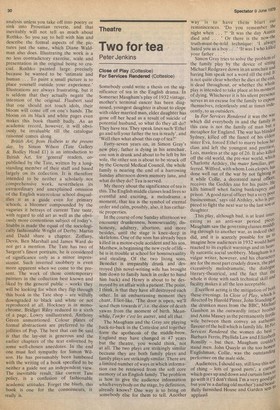Theatre
Two for tea
Peter Jenkins
Close of Play (Cottesloe) For Services Rendered (Cottesloe) Somebody could write a thesis on the significance of tea in the English drama. In Somerset Maugham's play of 1932 vintage, mother's terminal cancer has been diagnosed, youngest daughter is about to elope with older married man, elder daughter has gone off her head as a result of suicide of potential husband, so what do they all do? They have tea. They speak lines such 'Ethel go and tell your father the tea is ready', and 'Well then what about this cup of tea?'
Forty-seven years on, in Simon Gray's new play, father is dying in his armchair, one son is drunk and about to be left by his wife, the other son is about to be struck off by the General Medical Council, the whole family is nearing the end of a harrowing Sunday afternoon down memory lane, and what do they do? Tea is served.
My theory about the significance of tea is this. The English middle classes lead lives so eventful and exciting, a melodrama a moment, that tea is the symbol of eternal order and calm, possibly, also, it has cathartic properties.
In the course of one Sunday afternoon we encounter drunkenness, homosexuality, dishonesty, adultery, abortion, and more besides, until the stage is knee-deep in skeletons. One of the sons has already been killed in a motor-cycle accident and his son, Matthew, is beginning the new cycle of life — he is in trouble at school for homosexuality and stealing. Of the two living sons, Benedict is irreparably drunk and destroyed (his novel-writing wife has brought him down to family lunch in order to hand him back) and Henry is about to be destroyed by an affair with a patient. The point, I think, is that they have all destroyed each other. In an embarrassing moment they chant, Eliot-like, 'The door is open, we'll send them towards it', i.e. the door of death yawns from the moment of birth. Meanwhile, l'enfer c'est les autres, and all that.
The Maugham and the Gray are playing back-to-back in the Cottesloe and together form the apotheosis of the middle-brow. England may have changed in 47 years but the theatre, you would think, not at all. The two plays are strikingly similar because they are both family plays and family plays are strikingly similar. There are a limited number of ways in which information can be retrieved from the soft core memory of an English family. The problem is how to give the audience information which everybody on the stage, by definition, already knows? One way is to bring on somebody else for them to tell. Another way is to have them blurt out reminiscences. `Do you remember the night when . . . ?"It was the day Auntie died and . . . ' Or there is the now-the truth-must-be-told technique: 1 alwaYs hated you as a boy. . . "It was I who killed your father. . . ' Simon Gray tries to solve the problem of the family play by the device of sitting Michael Redgrave down in an armchair and having him speak not a word till the end. It is not quite clear whether he dies at the end, is dead throughout, or whether the whole play is intended to take place at his moment of dying. Whichever it is his silent presence serves as an excuse for the family to expose themselves, relentlessly and at times indecently, to us outsiders. In For Services Rendered it was the war which did everybody in and the famtlY 10 this case is not the family of man but a metaphor for England. The war has blinded Sydney, killed off the fiancé of his eldest sister Eva, forced Ethel to marry below her class and left the youngest and prettiest, Lois, manless at the age of 26. It also killed off the old world, the pre-war world, which Charlotte Ardsley, the mater familias, pre ferred. Wilfred, with whom Lois elopes, 118.5 done well out of the war by not fighting it while Collie, a decorated naval officer, receives the Geddes axe for his pains. Fle, kills himself when facing bankruptcy an prison. 'A good naval officer but a very Po°1 businessman,' says old Ardsley, who is prepared to fight the next war to the last son or daughter. This play, although bad, is at least interesting as an anti-war period plee,e,' Maugham saw the governing classes mock" ing through to another war, as indeed theY did, and it is scarcely possible for os t° imagine how audiences in 1932 would hove reacted to its explicit warnings and its heal(' ily sarcastic social snobbery. Maugham Is a vulgar writer, however, and his characters are for the most part crudely drawn, the plot excessively melodramatic, the dialogue literary-theatrical, and the fact that the, whole is done with such technical skill sou facility makes it all the less acceptable. Excellent acting is the mitigation of both these evenings. In Close of Play, which 15 directed by Harold Pinter, John Standing as, the drunken mess from the BBC, Michael Gambon as the outwardly intact brother and Anna Massey as the permanently fetid! wife between them convey an authentic flavour of the hell which is family life. In for Services Rendered the women do best Barbara Ferris, Phyllida Law and Elizabet:. Romilly — but then, Maugham could t stand men. John Quayle as the too honest Englishman, Collie, was the outstanding performer on the male side. Audiences, I should say, still love this sort of thing — lots of 'good parts', a curtallt which goes up and down and curtain lines .t01 go with it CI don't think I'm a very good g'( but you're a darling old mother') and beatitoifully furnished House and Garden sets t applaud.










































 Previous page
Previous page